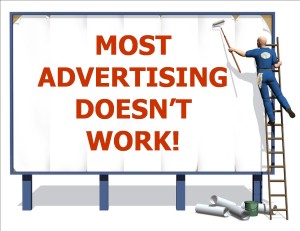
Some networks restrict you to only one or two different ad types, others have almost no limits. Ultimately, you need to decide which type of ad works best for YOU. Is it a text-only ad, a hybrid text-and-image ad, an image ad? Is it an email? Or should it be a banner sized at 300 x 250 pixels or a sky-scraper sized at 180 x 600? Should it be a full page that pops up for the targeted user, or a little ad that appears while he/she is surfing a particular site? Should it blend in with search results? Should it just be a link within a popular article?
[emember_protected for=4-5]
Similar considerations apply to your landing pages. Should you have a video or not? Should your text be long or short? Should you have massive headlines or small ones? Should the opt-in form be on the left or right – or below?
As you can see, there are many considerations here. Each approach has its advantages and disadvantages.
And you need to study YOUR OWN behavior online to have a better idea of what works FOR YOU. If it works on you – it may work on your target demographic!
Here are a few things to always keep in mind when designing your ads:
 Ad copy & images – Depending on your budget and selection of advertising networks and resources, you will already now have an idea of what types of promotions you will be going after. Perhaps it will be banner ads – in which case you need to have a few prepared in advance, following 3 or 4 of the most popular standard formats. Or maybe it will be text ads, in which case have your headline and body worked out in multiple versions. It might also be hybrid ads (like those you see on Facebook, where you have a bit of text AND an image). Or perhaps they will be emails you will want to use in solo ads. In either case, have the whole thing prepared in advance and take care to do the following:
Ad copy & images – Depending on your budget and selection of advertising networks and resources, you will already now have an idea of what types of promotions you will be going after. Perhaps it will be banner ads – in which case you need to have a few prepared in advance, following 3 or 4 of the most popular standard formats. Or maybe it will be text ads, in which case have your headline and body worked out in multiple versions. It might also be hybrid ads (like those you see on Facebook, where you have a bit of text AND an image). Or perhaps they will be emails you will want to use in solo ads. In either case, have the whole thing prepared in advance and take care to do the following:- Make sure you come up with multiple POWERFUL headlines. Text ads typically only allow up to 25 characters, so you really need to pack a punch here. Email ads don’t have this limitation, but you still need to be disciplined and clever here.
- Make sure you have compelling, powerful copy for the body of your ad. Typically up to 70 characters are allowed, although in some cases you may be able to go up to 130. Make sure you include a call to action as well as your display URL. No limits to body text in email ads, but – again – make sure your message packs a punch.
- Be prepared with your URLs which lead to specific landing pages.
- Those URLs can be direct-to-source using your affiliate code (not recommended, because you won’t be able to build your LIST, plus, your URL will be visible to all the CPV marketers who will try to “hijack†it with their promotions.). If you do decide to go this route, make sure to at least cloak your link using a URL-shortener like tinyurl.com
- It can also be a specific page on your site – or, if you’re using an ad tracker, you can enter multiple pages for split testing.
- It can also be your tracking ID (see below) including the above multi-page method.
- Also, you can disguise your link using a 301 redirect or a WordPress plugin like Pretty Link Lite.
At this point I recommend that you check out the provided “Simple PPC Secrets†along with three more special traffic reports (“TrafficWaveâ€, “Paid Traffic Basics†and “Secret Paid Traffic Resourcesâ€), which are all an integrated part of the enclosed Paid Traffic Mastery sub-course.
[/emember_protected]
 |
 |
 |
| Book 3 – Chapter 30Payment Models |
Course Overview | Book 3 – Chapter 32Test & Scale |
Book 3: 1, 2, 3, 4, 5, 6, 7, 8, 9, 10, 11, 12, 13, 14, 15, , 17, 18, 19, 20, 21, 22, 23, 24, 25, 26, 27, 28, 29, 30, 31, 32, 33, 34, 35, 36, 37, 38, 39, 40, 41, 42, 43, 44, 45, 46, 47, 48, 49, 50, 51, 52, 53, 54, 55, 56, 57, 58, 59, Overview
Bonuses: templ, lib, tips, kwds, models Link Res: aff, class, cpa, cpv, cpc, write, mob, outs, rss, soc, traff, var, exch, srcs, vid Sub-courses: sens adw, aff, ar, bkm, cpy, cp, fb, fun, goo, lst, loc, mem, opt paid, ppal, sbox, prod, seo, opt, socn, vidm, host, wp, lnch

